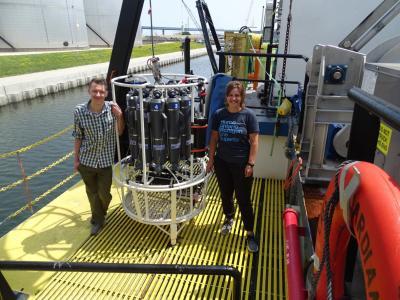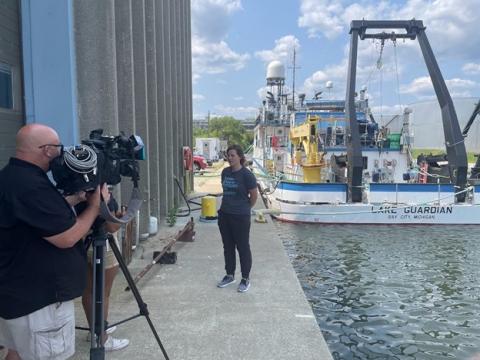EPA Great Lakes National Program Office (GLNPO) scientists Megan O’Brien and Matt Pawlowski were interviewed by reporter Susan Bence for WUWM’s podcast “Lake Effect” on July 31st, 2023. The “Lake Effect” podcast covers a variety of topics regarding people, places, and organizations in the Milwaukee area. The interview took place aboard EPA’s Research Vessel (R/V) Lake Guardian, EPA’s largest research vessel, while it was docked in Milwaukee alongside the University of Wisconsin-Milwaukee’s School of Freshwater Sciences.
GLNPO has conducted water quality and biology monitoring surveys on all five of the Great Lakes every spring and summer since 1983, with the exception of the 2020 season in which COVID-19 interrupted survey operations. More than 30 years of those surveys have been conducted on the R/V Lake Guardian. O’Brien and Pawlowski spoke with WUWM aboard the R/V Lake Guardian the day before the 2023 Summer Survey start.
In the interview, O’Brien and Pawlowski gave Bence a tour of the ship, explained how various sampling equipment is deployed, and discussed the different types of data collected while the Summer Survey is underway.
The Spring and Summer surveys are conducted in support of GLNPO’s Great Lakes Water Quality Monitoring Program and Great Lakes Biology Monitoring Program. For these programs, scientists use nets, bottles, grabs, sensors, and cameras to sample water, sediment, and planktonic and bottom-dwelling organisms. The EPA collaborates with scientists from partnering universities to complete this work. EPA’s open lake monitoring programs are funded through the Great Lakes Restoration Initiative and fulfill monitoring commitments under the Clean Water Act and the Great Lakes Water Quality Agreement with Canada.
GLNPO’s long-term monitoring programs are critical for assessing the health of the Great Lakes and identifying changes over time. The physical, chemical, and biological data collected aboard the R/V Lake Guardian have been used by EPA and researchers across the Great Lakes basin to understand changes in productivity due to changes in nutrient inputs as well as the effects of invasive species such as dreissenid mussels (zebra and quagga mussels). Data from the monitoring programs also support Great Lakes indicators included in the binational State of the Great Lakes Report prepared by EPA and Environment and Climate Change Canada.
You can listen to the podcast here. Milwaukee’s WISN 12 News also featured Megan O’Brien in a TV interview about the 2023 Summer Survey.



